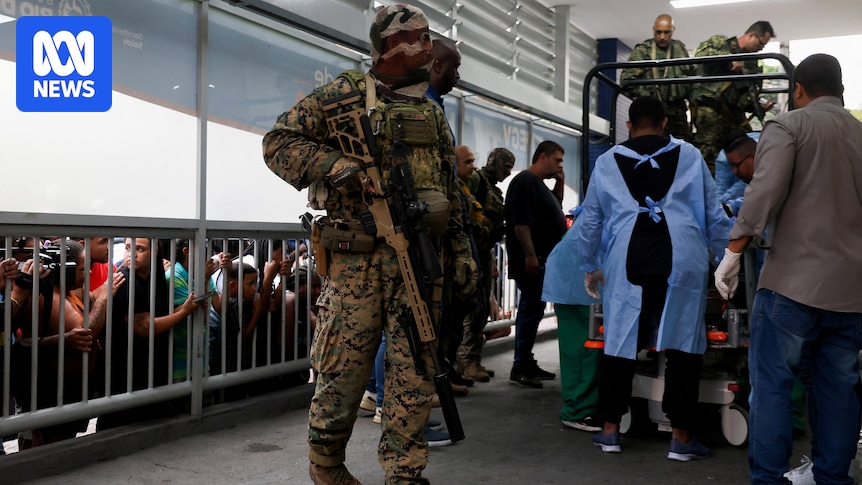
At least 64 people have been killed in Rio de Janeiro during a police operation targeting a major gang, just days before the city is set to host events related to the United Nations climate summit, COP30. The operation, now marked as Rio’s deadliest, underscores the ongoing struggle between law enforcement and organized crime in the city.
The operation was aimed at dismantling the Comando Vermelho, a notorious gang, and involved 2,500 security personnel across the Alemao and Penha favela complexes. These densely populated areas, characterized by their hilly terrain, have long been hotspots for criminal activity. The death toll, confirmed by Rio Governor Claudio Castro, includes four police officers and is more than double the city’s previous most lethal police operation.
Background of Police Operations in Rio
Rio de Janeiro has a history of conducting large-scale police operations against criminal groups, particularly ahead of major international events. The city, which hosted the 2016 Olympics, the 2024 G20 summit, and the BRICS summit in July, is no stranger to such crackdowns. Next week, Rio will host the C40 global summit of mayors, a precursor to the COP30 summit in Belem, scheduled from November 10 to November 21.
The police operations are often justified as necessary measures to ensure safety during high-profile events. However, they frequently result in significant casualties, raising concerns about the methods employed by law enforcement.
Details of the Operation
The operation in question saw smoke rising over Rio’s iconic skyline as gangs set cars ablaze to hinder the advance of armored vehicles. Gunfire echoed through the favelas, and police released videos showing suspects using drones armed with grenades against officers. The footage also depicted armed men fleeing into nearby forested areas.
In the aftermath of the intense fighting, special operations units began rounding up dozens of shirtless men, while sobbing family members gathered outside hospitals where the injured were being treated. The state government reported 81 arrests, as authorities sought to execute 250 arrest and search warrants targeting alleged drug kingpins and money-laundering operations.
“We stand firm confronting narcoterrorism,” Governor Claudio Castro stated, defending the operation’s scale and necessity.
Reactions and Criticisms
The operation has drawn criticism from civil society groups and human rights organizations. Carolina Ricardo, executive director at security think tank Sou da Paz, described the event as a tragedy, criticizing the military-style approach for failing to address the root causes of drug trafficking.
Human Rights Watch in Brazil called for an investigation into each death, with director César Muñoz labeling the events as “a huge tragedy” and a “disaster.” The city’s Education Department reported that 46 schools were closed, and the Federal University of Rio de Janeiro canceled night classes, advising students to seek shelter.
“The public prosecutor’s office must open its own investigations and clarify the circumstances of each death,” Muñoz urged.
Meanwhile, suspected gang members retaliated by blocking roads in northern and southeastern Rio, commandeering at least 50 buses for blockades, according to local media reports.
Historical Context and Expert Opinions
Rio de Janeiro has been the scene of lethal police raids for decades. In March 2005, 29 people were killed in the Baixada Fluminense region, and in May 2021, 28 were killed in the Jacarezinho favela. While Tuesday’s operation was similar in nature, its unprecedented scale has sparked debate about its effectiveness.
According to Luis Flavio Sapori, a sociologist and public safety expert at Pontifical Catholic University of Minas Gerais, these operations often fail to capture the masterminds behind criminal networks, instead targeting lower-ranking members who are quickly replaced.
“There’s a lack of strategy in Rio de Janeiro’s public security policy,” Sapori commented. “It’s not enough to go in, exchange gunfire, and leave.”
Governor Castro, from the conservative opposition Liberal Party, criticized the federal government for not providing more support in combating crime, taking a swipe at the administration of leftist President Luiz Inácio Lula da Silva. However, Gleisi Hoffmann, the Lula administration’s liaison with the parliament, pointed to recent federal actions against money laundering as evidence of ongoing efforts to tackle organized crime.
Implications and Future Considerations
The operation’s timing, so close to the COP30-related events, highlights the ongoing tension between maintaining security and respecting human rights. As Rio prepares to welcome international dignitaries and global leaders, the city must balance its image as a safe and welcoming host with the realities of its internal security challenges.
Moving forward, the effectiveness of such operations will likely continue to be scrutinized, with calls for more strategic and less violent approaches gaining traction. The international community, attending the upcoming climate summit, may also weigh in on the broader implications of such operations on human rights and public safety in Brazil.
As Rio de Janeiro grapples with these complex issues, the world watches, waiting to see how the city will navigate its dual roles as a hub of international diplomacy and a battleground in the fight against organized crime.






